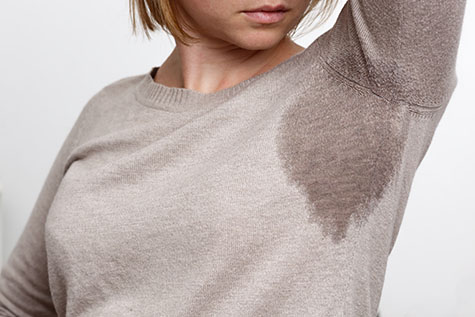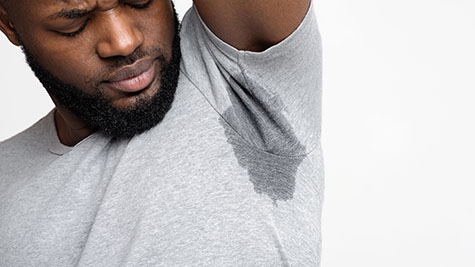What Causes Excessive Sweating?

Hyperhidrosis is often due to overactive nerves triggering excessive sweating for a variety of reasons.
You may suffer hyperhidrosis due to:
- Genetics
- A medical condition, such as diabetes or gout
- Side effects from medication or supplements
Why Types of Hyperhidrosis Are There?
There are two basic types of hyperhidrosis:
- Primary hyperhidrosis, which occurs with no underlying cause, but can be triggered by common external factors like caffeine, stress, exercise, etc.
- Secondary hyperhidrosis, in which sweating is the result of another medical condition, a side effect of medication use, etc.
Who Gets Hyperhidrosis?
You may develop hyperhidrosis regardless of your age, race, gender, or other factors. The condition is especially prevalent in adolescents or women going through menopause. However, it is believed that the condition is more prevalent than reported, as many people never seek a diagnosis or treatment.
How Can I Prevent Excessive Sweating?
Some steps you can take to prevent excessive sweating include:
- Wear natural, breathable fibers
- Keep track of your triggers and avoid them if possible
- Use antiperspirant rather than a deodorant
- Apply antiperspirant before bed

Why Treat Excessive Sweating?
Often, our patients seek treatment for excessive sweating because they find the condition to be embarrassing or annoying to manage. In addition, excessive sweating in certain areas of the body can lead to other complications, including skin infections like athletes’ foot.
How Can I Treat Hyperhidrosis?

Typically during a clinic visit, a board-certified dermatologist can diagnose hyperhidrosis through a detailed clinical history and physical exam. Occasionally, lab tests may be needed to diagnose the specific cause of your excessive sweating, but usually, these are unnecessary. Once the diagnosis has been made, your dermatologist will recommend treatment options which may include:
- OTC clinical-strength or prescription antiperspirant
- Botox injections
- Oral anticholinergics
- Topical glycopyrrolate
- Tap water iontophoresis
- Miradry
Schedule an Appointment
Excessive sweating can be a source of embarrassment and frustration, but thankfully, a board-certified dermatologist can help. At Arlington Dermatology, our board-certified dermatologists create custom treatment plans that work with your unique needs and symptoms, so you can move on from worrying about hyperhidrosis.
To schedule your appointment at Arlington Dermatology, please call our office or request an appointment through our online form.


